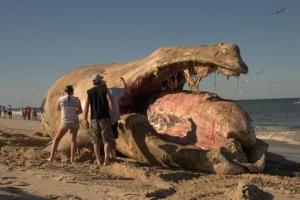Dead Right whale beached at Seashore Park
Federal officials crowded around the corpse of a North Atlantic Right whale, beached off Keybox Road in Delaware Seashore State Park. The whale, an endangered species, was towed to Cape shores Thursday, July 1.
David Morin, a marine mammal specialist with the National Oceanic and Atmospheric Administration (NOAA), watched as a backhoe flipped the 50-foot whale onto its belly. He flew in from Gloucester, Ma. to join marine scientists from Virginia and New York. The whale was first located Sunday, June 27 nearly 50 miles off the Cape Region. The U.S. Coast Guard towed it closer to shore, where a private contractor finished towing it to the beach.
There are only about 350 Right whales in existence, Morin said; scientists are compelled not only to determine the cause of death, but learn as much from the corpse as they can.
He said some of the best minds in marine biology were on-hand to perform the necropsy: Dr. Michael Moore of the Woods Hole Oceanographic Institute and Bill McClellan of the University of North Carolina, Wilmington.
“If anyone can figure out who killed this whale, they can,” he said.
Scientists will dissect the whale Friday, July 2. They should be able to determine whether the whale died of natural causes or by human intervention – pollution, entanglement or collision with a ship. Until then, Morin said, it’s impossible to tell how long the whale has been in the water, kept afloat by blubber and decomposition gasses.
Officials should finish within the day, Morin said. While they have yet to decide how to dispose of the whale, he said NOAA typically prefers to bury stranded marine mammals. He said the whale won’t obstruct Fourth of July crowds.
“Obviously, the area has its own plans for the weekend,” he said.
Marine Education, Research and Rehabilitation (MERR), a nonprofit organization based in Lewes, was managing the site for federal officials. Director Suzanne Thurman said the state Department of Natural Resources and Environmental Control chose to beach the whale at Seashore State Park because strandings often occur there; park officials are used to dealing with marine mammals.
“They know their parks, and they know what’s going to work,” Thurman said.
Right Whales can grow to be 70 feet and weigh 80 tons. The Right feeds on tiny crustaceans called copepods, filtering them through strands of broom-like teeth called baleen. In the summer, they migrate north to the Gulf of Maine.






















































